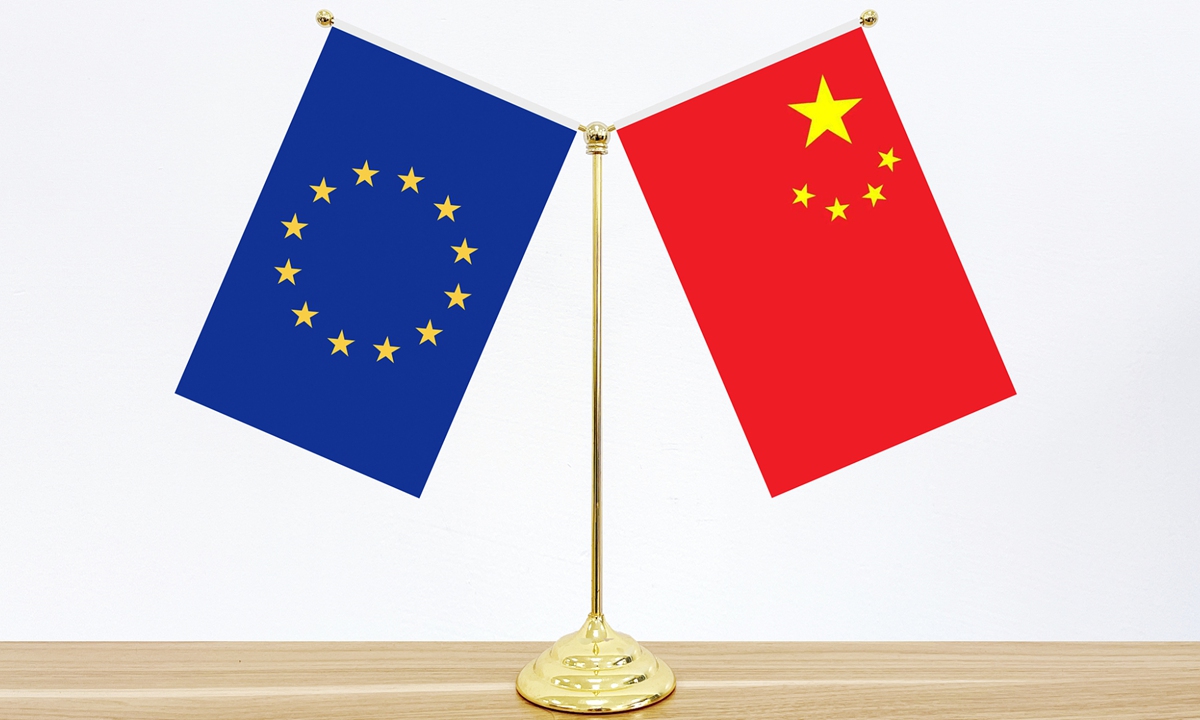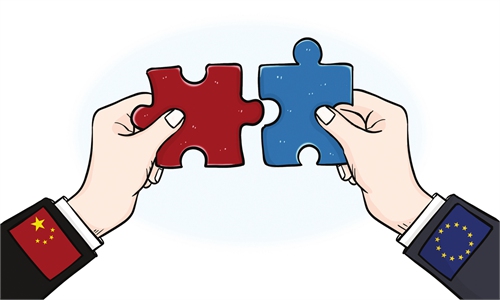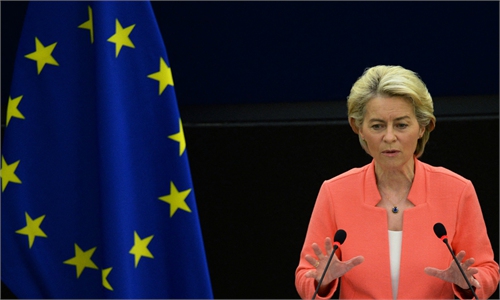
China EU Photo:VCG
At a critical moment when the conflict between Russia and Ukraine continues to deteriorate and the triangular relationship between the US, Europe, and Russia has reached a stalemate, European leaders are seeking to visit China.At the time when China-EU relations were in the "honeymoon phase," high-level bilateral visits were frequent, economic and trade cooperation was fruitful, and mutual political trust was the cornerstone of the stable development of the relationship between China and the EU.
Nevertheless, with the quick development of China and the US implementation of a containment strategy toward China, China-EU relations have had to face new challenges. Since 2019, the EU has had a different attitude in its relations with China, i.e. China is not only a partner of Europe on major global issues such as trade and climate change, but also a competitor in the high-tech and economic sectors. With the outbreak of the Russia-Ukraine conflict, the spread of the COVID-19 pandemic, and the increase of US control over Europe, the aspects of competition and confrontation between China and the EU have increased and the opportunities for cooperation and contact have decreased, which has had a long-term impact on the stability and development of bilateral relations.
Today, due to the prolonged conflict between Russia and Ukraine, the EU has become strategically important in the confrontation between the US and Russia. The EU also adheres to the three principles of confrontation-containment-participation when it comes to EU-Russia relations, i.e. confrontation and pressure, sanctions and containment, and participation in minimal cooperation. The decoupling and multiple rounds of sanctions against Russia, in particular, have brought EU-Russia relations to a maximum freezing point since the end of the Cold War.
The EU cannot be fully considered as an autonomous entity taking action in the international community. It lacks a military force that makes it truly independent of superpowers' will. The EU is a kind of international hybrid without a will of its own, and this is the reason why its member states prefer to take actions on their own, and not in the name of a unitary entity that does not really exist. The weakest EU member states only take actions on behalf of the EU, because they feel more protected by the US nuclear umbrella. They fear any initiatives of their own may annoy the US.
Instead, the health of China-EU relations should be linked to the welfare and wellbeing of the world and Europe itself. The thorough development of China-EU relations - if the EU had the capacity to take actions on its own without seeking permission from third parties - would help promote global economic recovery, maintain world peace, and counter the superpowers' hegemony in both East and West, without taking sides. On the contrary, cracks and problems in China-EU relations will damage bilateral relations and negatively affect bilateral cooperation, thus making the moralist attitude and politically correct talk of this political dwarf and economic giant that is the EU- which cannot even solve the migration issue without dumping it on Italy's shoulders - even more useless.
Since the outbreak of the conflict between Russia and Ukraine, the development of relations between China and the EU has also been affected by many adverse factors. For instance, the US' Biden administration has continuously put pressure on the EU, trying to exploit the crisis and turn the EU into a rampart to simultaneously encircle China and make the EU become Ukraine's arms supplier. At a time when the Atlantic faction is gaining the upper hand and European strategic autonomy is being further suppressed, the European economy and society are paying a huge price. Europe's participation in sanctions against Russia has directly led to energy and manufacturing crises, inflation and social unrest.
At the same time, China's growth is becoming an unavoidable and constant political issue in Europe. The European leaders noted Chinese strength and also saw China's diplomatic influence in promoting reconciliation between Iran and Saudi Arabia; in trying to convince to achieve peace and promoting talks on the Russia-Ukraine conflict; in improving China-EU relations; in strengthening EU dialogue and cooperation on major global issues, which is recently becoming an important political appeal for European politicians visiting China one after another.
For example, Spain is about to take over the rotating EU presidency. Prime Minister Pedro Sánchez expressed his hope that China could contribute to restoring peace in Europe. He also emphasized that China could play a key mediating role in the conflict between Russia and Ukraine. It should be said that this statement epitomizes the aspirations of the leaders of many EU member states, but not all of them since - as mentioned above - many of them fear retaliation from the White House.
It is worth looking forward to the visit of French President Emmanuel Macron and European Commission President Ursula von der Leyen. They are European leaders who have promoted the profound development of China-EU relations, even beyond the EU's pitiful and fake veneer of unity.
The author is an Italian expert on international affairs and Honorary Professor at Peking University. opinion@globaltimes.com.cn


